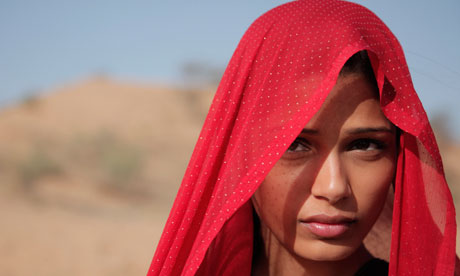
Michael Winterbottom is such a restlessly, brilliantly prolific and unparochial film-maker, declining to be limited either conceptually or geographically: always keeping us on our toes. This latest movie starts with a bold and intriguing concept, but is bafflingly muted and underpowered, its initial promise fading as it drifts away to a self-conscious conclusion. Trishna is a Thomas Hardy adaptation – Winterbottom's third, in fact, having made Jude in 1996 and The Claim (based on The Mayor of Casterbridge) in 2000. It is a loose reworking of Tess of the d'Urbervilles, and the story is transplanted to modern India where Jay (Riz Ahmed), the son of a rich Jaipur hotelier, is travelling with friends. One evening Jay is captivated by the delicate beauty of a young woman he sees at a party: this is Trishna, played by Freida Pinto. She comes from a poor family, and her father, a delivery driver, plunges the family into poverty by driving half-asleep on India's hair-raising roads and crashing his jeep. (It's a smart twist on one of the novel's most famous scenes.) The infatuated Jay hears about Trishna's plight and gets her a job at his dad's luxury hotel; and so begins a fateful relationship.
Any Hardy reader will find himself tipped off balance by the challenge in Winterbottom's bold opening. All the stuff about the father of Tess/Trishna and his delusions of family grandeur is jettisoned in favour of a fast, fluid introduction that actually centres on Jay: rich, a little conceited, but quite decent and high-minded. Wait: is he supposed to be Alec d'Urberville or Angel Clare?
An interesting ambiguity, but like so much else in the movie, it seems to get slowly but surely poured away into the story's damp sand. There is tragedy and violence, perhaps attributable to thwarted ambition: although both find themselves in the hotel business, Jay has dreams of being in Bollywood and Trishna is a talented dancer. Their dreams are soured and their life and love are on a tragically wrong track. Yet something prevents Ahmed and Pinto from expressing these emotions powerfully and satisfyingly enough, and Pinto never quite shows that her character is changed by what she has gone through. The story is rather shapeless, with little dramatic traction: it feels as if it could end at the one-hour mark or go on for another four. Winterbottom's location work in Jaipur and Mumbai has richness and spectacle, but somehow this does not come fully to life.

